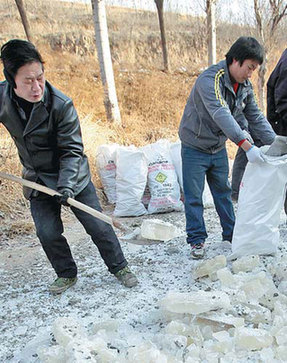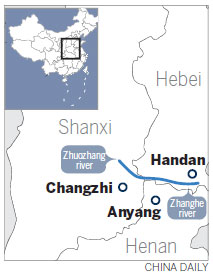Chemical leak into river puts focus on plant
Updated: 2013-01-11 07:25
By Wu Wencong and Sun Ruisheng in Shanxi and Peng Yining in Beijing (China Daily)
|
||||||||
Delay in reporting incident raises concerns, report Wu Wencong and Sun Ruisheng in Shanxi and Peng Yining in Beijing.
The lower area of the field, containing hundreds of withered cornstalks, was covered by a sheet of reddish-brown ice. Hundreds of people armed with iron picks and shovels were cutting holes roughly half a meter in diameter in the ice, clearing away the nearly 5-centimeter-thick layer. They then tipped large bags of activated carbon - charcoal treated with oxygen - into the half-meter-deep water underneath to absorb the contaminants.
 |
|
Villagers in Changzhi, Shanxi province, remove contaminated ice from the Zhuozhang River on Wednesday. Zhang Wei / China Daily |
The leak, caused by a crack in a delivery pipeline to a storage tank, of 30 tons of aniline, which has a density similar to water, was erroneously directed into the reservoir, which has lain unused since 1993.
As temperatures dropped to -13 C, the upper layer of aniline froze, allowing the clean-up teams to break the "ice" into pieces and ship it away, while using activated carbon to absorb the chemicals remaining in the unfrozen water below.
Almost 5,000 local people, including soldiers, police, and workers have been involved in the cleanup, according to the local emergency management office. By Wednesday afternoon, 670 metric tons of contaminated ice, and more than 750 tons of wastewater had been cleared away.
Ongoing investigation
It was the ninth day after chemical spill, reported on Dec 31, and an investigation team composed of officials and experts from the Ministry of Environmental Protection had just arrived in Changzhi. They had traveled from Handan in Hebei province, which has a population of more than 1 million people, and is one of the downstream cities affected by the aniline that flowed across the border from Shanxi.
"The investigation into the accident is ongoing. It's still far too early to discuss the issue of compensation," said Sui Xiaochan, a section head at the ministry's Center of Environmental Emergency and Accident Investigation and a member of the investigation team.
Four officials from the company that owns the plant, Tianji Coal Chemical Industry Group - a State-owned company that is one of China's largest producers of compound fertilizers - were sacked on Sunday. A general manager and a deputy manager were among them.
The Changzhi government said that at 7:40 am on Dec 31, plant employees conducting routine checks noticed aniline flowing out of the broken pipe. Approximately 39 metric tons leaked into an 80-sq-km river basin and affected 28 villages in Shanxi, and two other cities in the neighboring provinces of Henan and Hebei. Some water supplies to Handan were suspended briefly after the accident, but have now been restored.
 |
Sui said it was impossible to verify the report at this early stage of the investigation. The Handan government also was unable to confirm or deny the report when it held a media conference on Tuesday afternoon.
"We are attempting to contact the reporter to discover the source of his information," said Hu Sanhu, head of the Changzhi Government Information Office.
Although the date is unclear, one thing is certain: The Changzhi government didn't report the leak to the provincial authorities or inform cities located downstream, such as Anyang in Henan and Handan in Hebei, until Jan 5. The delay has increased the problems faced by the two cities as the authorities attempt to deal with the pollution.
Meanwhile, in a bizarre twist, the Winter Swimming Association in Handan has announced that it will sue Tianji Coal Chemical Industry Group for 20 million yuan ($3.2 million) in compensation for the potential harm caused by the polluted water.

 Li Na on Time cover, makes influential 100 list
Li Na on Time cover, makes influential 100 list
 FBI releases photos of 2 Boston bombings suspects
FBI releases photos of 2 Boston bombings suspects
 World's wackiest hairstyles
World's wackiest hairstyles
 Sandstorms strike Northwest China
Sandstorms strike Northwest China
 Never-seen photos of Madonna on display
Never-seen photos of Madonna on display
 H7N9 outbreak linked to waterfowl migration
H7N9 outbreak linked to waterfowl migration
 Dozens feared dead in Texas plant blast
Dozens feared dead in Texas plant blast
 Venezuelan court rules out manual votes counting
Venezuelan court rules out manual votes counting
Most Viewed
Editor's Picks

|

|

|

|

|

|
Today's Top News
Boston bombing suspect reported cornered on boat
7.0-magnitude quake hits Sichuan
Cross-talk artist helps to spread the word
'Green' awareness levels drop in Beijing
Palace Museum spruces up
First couple on Time's list of most influential
H7N9 flu transmission studied
Trading channels 'need to broaden'
US Weekly

|

|







